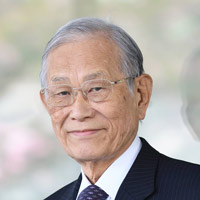Mar. 22, 2022 Perspectives Other
How the natural sciences will be enriched by the humanities
In his final days at RIKEN, President Hiroshi Matsumoto calls on the research community to embrace those asking big ethical, social, philosophical and political questions.
 © Dina Belenko Photography/Getty Images
© Dina Belenko Photography/Getty Images
One of the things I like to do is to ask scientists a question that often takes them a surprisingly long time to answer. The query: what will your work contribute to the world in 50 or 100 years? Mostly, researchers reach for answers that highlight contributions to their field, but I’m really asking what they will contribute to humanity.
Scientists will need to ask themselves bigger, more searching questions in the coming decades. The challenges we face today, such as climate change, an increase in neurological diseases, and how to integrate AI ethically into daily life, are multifaceted and will involve deeper thought on how we want to live.
It’s actually an old model of thought. The natural sciences were once called natural philosophies. But in the 17th century, in order to deeply understand how the Universe works mechanistically, philosophy was separated out. Since then, the natural sciences have become more and more specialized. And that move was necessary; it was a tool to help us understand the intricacies of each field, but now we must stretch our minds even further by both drilling down into detail and thinking in broader systemic and theoretical frameworks.
I believe there are many problems that can only be solved by the incorporation of three types of thinkers: researchers in the humanities and social sciences, who mostly deal with social phenomena; religious people and philosophers, who often deal with issues of the mind; and scientists in the natural sciences, who deal with the physical world mechanistically.
The study of the mind, for example, is greatly enriched by religious and philosophical insights. If we just mechanistically examine molecules, cells, neural networks and brains, it’s still very difficult to understand the complexity of the mind. I believe that there are many areas in which theologians and philosophers have a more advanced understanding of how we construct the world around us: they have thoroughly debated what thoughts are, what their limits might be, and how they might be interacting with our sense of self and perception. Buddhism, too, has long examined how our mindset affects our experience of the world and the reactions of our bodies. These understandings can only be reached using a highly theoretical view, which is quite different to the approach of the natural sciences. Indeed, many RIKEN researchers are interested in how intentions and emotions are created in the brain and could benefit from such insights.
The COVID-19 pandemic has also underlined how important these types of thought are to understanding what is happening to us today. Many researchers in the natural sciences are working to characterize the virus and create vaccines and therapeutic agents. However, the impact on people’s minds can’t be addressed in this way, nor the impacts our mindsets have on our bodies. These forces must be better understood to prepare for what is to come.
Japan's changing public policy
I’m not alone in calling for change; the Japanese government has recognized the need for more input from the humanities too.
In 1995, the Basic Act on Science and Technology, which described the Japanese government’s science and technology priorities, largely excluded the social sciences. As a consequence, the Japan Science and Technology Agency didn’t provide aid grants for study proposals focusing only on the humanities or social sciences. Companies collaborating with social science research organizations missed out on tax breaks and other incentives. Humanities and social sciences researchers on public payrolls tended to receive lower salaries compared to their natural science counterparts.
But this position has been revised in response to the growing importance of the social sciences amid advances in the life sciences and artificial intelligence (AI) research. In April 2021, the wording of the act was changed to include increased promotion of the humanities, and it was renamed the Science, Technology and Innovation Basic Law.
As a result, the scope of RIKEN’s research can now more easily expand. We can recruit key talent from the humanities. One of my final wishes as president of RIKEN is to incorporate rich discussions from the humanities into RIKEN’s daily activities. To do this, it is necessary for natural science researchers and people with vivid imaginations, such as philosophers and literary scholars, to become part of each other’s daily lives. Our epidemiologists, neuroscientists, robotics and AI experts are primed to benefit from this move.
Even prior to the change in law, the RIKEN executive had been aware of the need for this change. To smooth the way, we adopted the concept of kagakudo, which can be loosely translated as ‘the path of science’, to emphasize that scientific research is a path that should be linked to society and to the humanities.
We also established the Innovation Design Office, which has taken a humanities-style approach and held forums that developed many written scenarios looking ahead several decades. The idea was to more holistically explore possibilities, challenges and bottlenecks. These scenarios included what it might look like if humans were living in space or if we all lived to 120 years of age. They are designed to trigger deeper thought, ideas and innovation in scientists.
Rich resources
There are reasons that different fields have increasingly come together. When I was a young researcher in the area of radio space science, I called for increased collaboration in theory, mathematics and experimental research. It was common back then to use approximate values in simulations, and I did not want to do that. I wanted mathematics and experimental research to help stimulate the theory and vice versa. But in those days computational power was still low. Now with increasing power, such as that of our Fugaku supercomputer, we have been able to achieve greater precision in simulations so that in theory, mathematics and experimental research should easily work in tandem.
Indeed, many fields ignore the huge holes that theoreticians try to unpick. Natural science researchers such as physicists and chemists, examine fundamental questions about how the world works. But why the Universe, life and human beings exist in the first place is still a mystery. Some physicists argue that the Universe exists because of human beings’ existence, but this ‘anthropic principle’ is closer to an idea than a science. I don’t know if we can fully examine this issue at the core of science using the natural sciences in isolation.
Although the SARS-CoV-2 pandemic has caused a tragic loss of life, it has also helped wider society ask more searching abstract questions. It has never been clearer to the global population that we must tackle this problem from a mechanistic, social and moral stance. In addition to this, we are reaching the limits of capitalism, as evidenced by a rising child poverty rate among other things, meaning that today’s politicians must work with the sciences to marry evidence-based policy with new theoretical paradigms of how to create a healthy social order.
The ultimate goal for most researchers is to connect their research results to the happiness of people. However, I believe that this goal is sometimes difficult to see in the midst of daily research and increasing specialization. I would like to provide researchers with more opportunities to think about the mind and recognize social issues, in a sense, to help them go back to the basics.
It will be fascinating to watch research evolve in this unprecedented time and I look forward to observing new inspiration and richness in the sciences.
About the Researcher
Hiroshi Matsumoto, President, RIKEN

Hiroshi Matsumoto is an atmospheric scientist. He was President of Kyoto University from 2008 to 2014, and became President of RIKEN in 2015. In 2015, he also became a Chevalier in the French Legion of Honour, in 2017 he became an Honorary Officer of the Most Excellent Order of the British Empire (OBE), and in 2021, he became a Grand Cordon of the Order of the Sacred Treasure, an award established in 1888 by Japan's Emperor Meiji.
